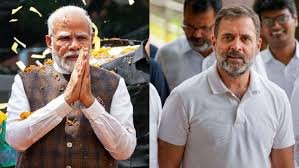In contemporary Indian politics, the quest for justice has become a poignant and complex journey, particularly under the rule of the Bharatiya Janata Party (BJP). The party, led by Prime Minister Narendra Modi, has been at the helm of the Indian government for over a decade, shaping policies and steering the country’s governance. However, a significant segment of the populace perceives that expecting justice from this administration might almost be regarded as a “crime.” This perception stems from a blend of dissatisfaction, frustration, and an overarching sense of disenchantment with the justice system and its interactions with political power.
In contemporary Indian politics
The Political Landscape: An Overview The BJP, with its roots deeply embedded in nationalist and right-wing ideologies, has consistently pursued a vision of India that emphasizes economic growth, national security, and cultural revival. The party’s governance style has often been characterized by its robust approach to policy implementation and its assertive stance on various national and international issues. However, this assertiveness has not been without controversy. Critics argue that the party’s approach to justice and its mechanisms can sometimes be perceived as partial or skewed.
The Quest for Justice: Expectations vs. Reality Expectations from any government, regardless of its political orientation, are grounded in the fundamental belief that justice should be impartial, equitable, and accessible to all citizens. The judiciary and law enforcement agencies are seen as the custodians of justice, responsible for upholding the rule of law and ensuring that citizens’ rights are protected. However, when the government’s actions or policies appear to undermine these principles, the public’s faith in the system is tested.
The Quest for Justice: Expectations vs. Reality Expectations
Under the BJP government, there have been instances where people feel that the scales of justice are tipped in favor of political or ideological interests rather than impartiality. Whether it’s issues related to freedom of expression, civil liberties, or the handling of dissent, a narrative has emerged that questions the integrity of the justice system. This perception has led some to believe that expecting a fair and unbiased judicial process might be seen as an act of defiance or even subversion.
Notable Cases and Public Sentiment Several high-profile cases and political decisions have contributed to the growing sentiment of disillusionment among the public. Allegations of selective enforcement of laws, controversial amendments to legal frameworks, and the perceived suppression of dissenting voices have all fueled concerns about the fairness of the justice system.
For instance, the handling of various protests and movements, such as those related to citizenship laws or farmers’ rights, has sparked debates about the extent to which the government respects and upholds democratic values. Reports of increased surveillance, curbs on freedom of speech, and the alleged harassment of activists and opposition leaders have further amplified these concerns.
The Political Landscape: An Overview The BJP
The Role of Media and Public Discourse In the digital age, media plays a crucial role in shaping public perception and discourse. The portrayal of issues related to justice and governance often reflects broader societal attitudes and can influence how these issues are perceived. Under the BJP administration, the media landscape has been a subject of intense scrutiny, with accusations of bias and censorship being frequently discussed.
The rise of social media platforms has allowed for a more democratized dissemination of information, but it has also led to polarized narratives. Public discourse around justice and governance is increasingly characterized by a division between those who support the government’s policies and those who criticize them. This polarization can sometimes obscure the nuanced realities of the justice system and its interactions with political power.
The Path Forward: Rebuilding Trust and Ensuring Accountability Addressing the concerns related to justice requires a concerted effort to rebuild trust and ensure accountability within the system. For the government, this means reinforcing the independence and impartiality of judicial institutions and demonstrating a commitment to upholding democratic values.
For the public, it involves remaining engaged in civic processes, advocating for transparency, and holding both the government and the judiciary accountable. Civil society organizations, media, and legal experts play a crucial role in this process, providing oversight and facilitating informed discourse.
Conclusion The notion that expecting justice from the BJP government might be considered a “crime” reflects broader concerns about the intersection of politics and justice in contemporary India. While the government has its vision and policies, the fundamental principles of justice—impartiality, fairness, and respect for human rights—must remain paramount. Navigating this
भाजपा सरकार में ‘न्याय की उम्मीद’ करना भी गुनाह है!
— Rahul Gandhi (@RahulGandhi) August 28, 2024
कमज़ोरों और वंचितों के खिलाफ गंभीर से गंभीर घटनाओं में भी जिनकी प्राथमिकता न्याय नहीं अपराध छिपाना हो, उनसे कोई क्या ही उम्मीद करे?
फ़र्रुख़ाबाद में हुई घटना बेहद दुर्भाग्यपूर्ण है, पीड़ित परिवार के साथ प्रशासन का ऐसा रवैया… pic.twitter.com/XEMX4IsIDs
